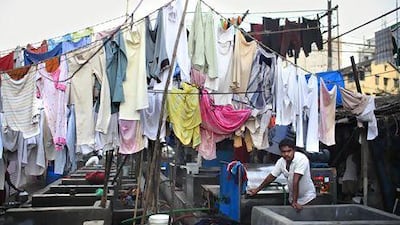Next to the Mahalaxmi train station in the centre of Mumbai, hundreds of Indians are engaged in the business of washing clothes.
Workers knee-deep in soapy water hand-wash sheets, while others drag around large wooden trolleys laden with sackfuls of garments.
Many aspects of the Dhobi Ghat, often described as the world's largest outdoor laundry, are reminiscent of a bygone era in a rapidly modernising city.
But new tower blocks have sprung up around the laundry and the sound of the dhobis, or washermen, scrubbing and wringing clothes is accompanied by the hum of large washing machines.
The dhobis, whose families have worked and in many cases lived at the laundry for generations, are slowly adapting to modern technology, while the local government is working on a 60 million rupee (Dh 4.1m) renovation in an effort to make the laundry more appealing to the thousands of tourists who visit what has become one of Mumbai's most important heritage sites.
The laundry was built by the British in the 1880s. More than 10,000 Indians depend on the laundry for their livelihoods, Santosh Kanojia, the chairman of the Mahalaxmi Dhobi Ghat society, explains.
"There have not been many changes," Mr Kanojia said. "We've acquired some machinery and instead of black soap we're using powder. Rather than coal irons most are now using electric irons."
The dhobis rent a "stone" in the laundry, where they wash the clothes. Getting access to one of the 731 stones is not easy, with those who have stones having staked their claim because their families have been based there for decades and they have been born into the trade. The rent on each of these is 300 rupees a month, which is paid to the municipality. Much of the demand for the dhobis' services come from Mumbai's hotels and catering firms. Work in the laundry begins at the crack of dawn and continues until about 10 in the evening, with items being washed for a fee that sometimes can be as low as 3 rupees.
Located on prime land in the centre of South Mumbai in a city that is squeezed for space, Mr Kanojia explains that developers are eying the laundry with interest, keen to develop lucrative commercial and residential tower blocks on the site. He adds that there is little risk of this happening, though.
"Many builders are trying, but the government recognises the heritage," he says. "There isn't this kind of laundry anywhere else in the world. Since 1999 we have been in the High Court, fighting for our land [to be handed over to the dhobis]. We want to develop the land for commercial purposes for the dhobis." He says that the Brihanmumbai Corporation (BMC), the local government, had agreed in 1993 to hand over the land to the dhobis.
The local government has, however, launched a 60m rupee programme to "beautify" the laundry, where rubbish is strewn around the site and much of the structure is simply makeshift.
Although work began in 2010, progress on the project seems to have been slow.
Meanwhile, the dhobis are adapting to try to boost their revenues.
While many of the dhobis have bought washing machines, others prefer more traditional methods. Workers can still be seen stoking wood furnaces, which heats water in a metal drum containing clothes. Even those with washing machines still hand wash garments as well.
Marimuthu Shetty has been working in the Dhobi Ghat since he was 10 years old. He bought a washing machine about a year ago and employs four workers. The washing machine cost 300,000 rupees but he explains that it has boosted his income by 10,000 rupees a months, which is increasing his profits as he pays off the loan on the machine in monthly instalments.
"I was finding it difficult to meet the orders before I bought the machine," he says.
Nasir Kureshi has a stone in the laundry and has two people working for him, but they still wash everything by hand.
"Even if the business is becoming more modern, you'll still need people for hand washing clothes," he says. "I don't feel threatened at all."
Vivek Londhe, who used to work in the Dhobi Ghat, has set up a laundry business with modern industrial dryers, washing machines, and 20 employees, next to the site. He explains that he is swamped with orders from the Indian Railways and sports clubs in Mumbai, washing 4,000 to 5,000 items a day.
Meanwhile, it is not just businesses such as Washimbe Power Laundry that pose a threat to the heritage of the Dhobi Ghat. Many of the dhobis say that they do not expect their children to continue the family business.
Mr Shetty says he wants his children to study and go into a different profession.
"This is a job for the uneducated," he says. "My daughter will study and maybe she'll be a doctor."
Thirumel Sangula, 30, another dhobi, explains that his father lived in the laundry for his whole life. But his own family is based in a village. He wants his children to continue their education and take up higher paid, less laborious jobs. Asked if he has thought about the future of his family business, he simply responds: "That's a long way off."

